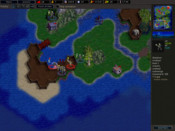Difference between revisions of "Undead (race)"
(Updated for 1.10) |
m (updated unit tree link) |
||
| Line 5: | Line 5: | ||
faction=[[Undead]] | | faction=[[Undead]] | | ||
alignment=Chaotic | | alignment=Chaotic | | ||
| − | tree=[http://units.wesnoth.org/1. | + | tree=[http://units.wesnoth.org/1.12/mainline/en_US/mainline.html#Undead 1.12] |
}} | }} | ||
Revision as of 03:03, 13 November 2016

| |
| Faction(s) | Undead |
| Alignment(s) | Chaotic |
| Race tree | 1.12 |
Undead are not really a single race of creatures, although often treated as such. Almost any dead creature can, by a sufficiently skilled necromancer, be reanimated and rise again in undeath. Undead are for the most part unnatural but mindless constructs, obeying whoever created them without question nor thought. A greater mystery of necromancy is in how constructs are sustained without continuous effort from the necromancer. An undead creature does not require the constant attention of the necromancer to command and sustain, but can work autonomously according to the commands of it's master. Only rarely, perhaps once every few months, does the necromancer need to maintain his creation.
Necromancy is almost solely limited to humans. Even the legends of magically apt races like elves and mermen tell of very few of their kind who have ever delved in the dark arts. It is surmised that necromantic magic requires great adaptability and a flexible mind, extremes of which are most commonly found in humans.The ultimate goal of most necromancers is to turn the same art of preserving and imbuing life upon themselves, to alter themselves at whatever cost, to ultimately escape death by preserving their own mind and spirit.
Geography
While undead lords arrived on the Great Continent in considerable numbers only in the wake of Haldric I, they were not completely unheard of by elves and dwarves before that.
See also
| Races of Wesnoth |
|---|
|
Major: Drakes • Dwarves • Elves • Humans • Orcs • Undead Minor: Merfolk • Nagas • Ogres • Saurians • Trolls • Woses • Monsters |
